The much-publicized case of Ms. Kimberly Jean Bailey Davis (Ms. Kim Davis) the elected country clerk for Rowan County, KY intrigues me on several levels. Ms. Davis defied an order from Judge David L. Bunning of the U.S. Court for the Eastern District of Kentucky that she issue marriage licenses to same gender couples. This defiance followed the U.S. Supreme Court (SCOTUS) decision in Obergefell v. Hodges, which ruled that the 14th Amendment to the U.S. Constitution guarantees the right to same gender marriage.
Ms. Davis continued her refusal to issue marriage licenses to all couples despite instructions from Kentucky Governor Steve Beshear, who offered Ms. Davis a rational way out of her self-imposed dilemma: Resign or authorize her deputies to issue all marriage licenses. Ms. Davis, claiming religious opposition to same gender marriage, refused and served five days in jail for contempt of Judge Bunning’s order. She apparently was released from jail after agreeing not to interfere with her deputies issuing marriage licenses to all couples. Ms. Davis has resumed her county clerk duties except for issuing marriage licenses herself.
Ms. Davis and others claim she is being martyred for her religious beliefs following a mid-life conversion and affiliation with an “apostolic” evangelical church. I do not resonate with the subset of the Christian Community of Believers to which Ms. Davis belongs or with her interpretation of Holy Scripture, but I will accept as genuine her conversion and religious principles in her mind. We should avoid any snarky comments about Ms. Davis’ multiple divorces, her life before her religious conversion, or the nature of the conversion itself. Even so, Ms. Davis’ beliefs and actions are fair game for rational discourse.
Martyrdom
From the time of the Christian persecutions in the Roman Empire, religious martyrs have been defined as persons killed for maintaining a belief, knowing that this commitment would result in imminent death. Typically, martyrdom occurred when Christians refused to make what the Empire considered a simple patriotic assertion once a year in a Roman temple: Caesar is Lord and Master. This declaration was much like our Pledge of Allegiance and generally devoid of religious meaning because, by the time of the early Christian church, most Romans did not believe in their historical gods. Christian martyrs refused to participate because they believed the construct, Lord and Master, was reserved only for Jesus Christ.
Political martyrs suffer persecution and/or death for advocating, renouncing, refusing to renounce, and/or refusing to advocate a political belief or cause.
Ms. Davis does not qualify as a martyr in either the religious or political meanings. Certainly, no rational person advocates putting Ms. Davis to death for her beliefs and her actions based upon those beliefs. Persecution does not apply because she willingly chose to disobey a lawful order resulting from the SCOTUS ruling and must, therefore, accept the consequences. No civil authority forced Ms. Davis to resist Judge Bunning’s order. Can we imagine Christians in the Roman Empire saying, “We refuse to declare Caesar as Lord and Master but you can’t throw us into the arena because of our profound religious beliefs?”
Ms. Davis wants to disobey a lawful civil order issued under the authority of the Constitution without being punished for that disobedience. That is, she prefers to keep her $80,000 annual salary while refusing to carry out her Constitutional duties as county clerk. She may claim her Christian beliefs regarding the ostensible immorality of same gender marriage supersede the Constitution, but she and many of her supporters ignore the fact the Constitution generally does not recognize the validity of religious beliefs outside the Establishment and Free Exercise clauses of the 1st Amendment: Congress shall make no law respecting an establishment of religion, or prohibiting the free exercise thereof…Conscientious objection to military service may be an exception in the sense that religious principles are recognized; nevertheless, civil penalties often result from the failure to serve in the military during times of war.
Through the genius of the Founders, the 1st Amendment allows us to live and act in accordance with our religious beliefs unless our actions violate civil laws under the Constitution. Once such violations occur even if through sincerely held religious beliefs we cannot expect to escape punishment under the civil laws. Importantly, no one prohibits Ms. Davis from exercising her religious beliefs outside of her Constitutional duties as county clerk. Furthermore, her Constitutional rights to free speech and freedom of religion have not been infringed.
The Morality Conundrum
Morality can be a tricky issue. On the one hand, Ms. Davis believes her interpretation of Holy Scripture prohibits same gender marriages as profoundly immoral acts; hence, her refusal to issue marriage licenses her Constitutional duty to same gender couples. By refusing to carry out her county clerk duties, Ms. Davis attempts to force her religious principles on all citizens of her county. On the other hand, Ms. Davis probably believes the Federal courts seek to force their “immoral” views on her. Thus, the conundrum: Whose version of morality prevails?
So far, the Federal court system maintains Ms. Davis cannot force her vision of morality on the citizens of Rowan County. Numerous appeals of Judge Bunning’s order are in progress or threatened, and we may confidently expect interested parties to propose legislative relief for Ms. Davis when the Kentucky legislature reconvenes. Proponents of these projected laws based upon Religious Freedom Restoration Acts expect this legislation to support Ms. Davis and other persons who object to civil laws on religious principles. I question if such state legislation will pass subsequent Constitutional muster.
The Genesis of the Problem
The controversy surrounding Ms. Davis and others who attempt to use religious beliefs to supersede the Constitution involves the following quasi-logical chain of thought: Most of the Constitutional Framers were Christians. They produced a document exemplifying a rational outgrowth of Christian principles and ensures majority rule. Accordingly, the U.S. is defined as a Christian country, and the Constitution equates to a Christian document. The Establishment Clause stipulates freedom of religion, not freedom from religion; therefore, the Establishment Clause applies specifically to Christians.
This line of reasoning leads to the following erroneous conclusions: Only Christians should be allowed to vote in the U.S.; majority rule involves only Christians; and non-Christians may live and work in the U.S. without a role in its governance.
I have studied the Constitution on several occasions without finding an explicit reference to Jesus Christ in the document. A plain reading of the text reveals that, regardless of their own religious persuasions and practices, the Framers wrote a non-Christian document preventing the U.S. from establishing any specific religion, including Christianity. Importantly, the Constitution neither forbids the practice of any religion nor gives precedence to any religion: The Framers constructed a level playing field with respect to religions.
The only way to get around this Constitutional reality depends upon a broad and non-literal interpretation and application of the Framers’ supposed intent. That is, the framers wanted a Christian constitution and country. Such an outcome may have been what the Framers intended and assumed would happen, but that’s not what they wrote into the Constitution.
The plain words of the Constitution show the Framers did not want a government like the theocracies that bedeviled most European countries at the time of our Constitutional Convention in the later part of the 18th Century. The Framers established a peaceful coexistence between religion and government through the 1st Amendment. This critical Constitutional component requires the free exercise of religion and its disestablishment—in other words, freedom and restriction. All religious are allowed (except for those advocating the violent overthrow of the Constitution) but no religion can be the government or run the government.
The Framers understood the dangers of too much liberty, i.e., licentiousness. Ms. Davis asks for too much liberty when she demands a religious right not to issue marriage licenses to same-gender couples because they offend her faith. Such a demand is not religious liberty but, instead, is theocracy plain, pure and simple. I am unwilling for Ms. Davis, former Gov. Mike Huckleberry, Sen. Ted Cruz, and others of their persuasion to lead this country into a theocracy.
Yes, I long for the time when “every knee shall bow and every tongue profess Jesus Christ as Lord” but we won’t get there through legal coercion, which is what Ms. Davis requests.
A Way Forward
Ms. Davis and people like her who find their religious beliefs in stark contrast to their duties under the Constitution should make an informed choice follow the civil laws or face the consequences. Yes, such a choice may result in loss of income or even imprisonment, if an accommodation like the one Ms. Davis apparently has made cannot be reached. Ms. Davis is not unique in having to make such a choice. Petitioning for redress by asking the courts to allow religious principles primacy over Constitutional duties actually means making an un-Constitutional request in violation of the 1st Amendment.
Of course, Ms. Davis and persons in situations like hers have the Constitutional right to mount a campaign to amend the document. I don’t wish them luck and I don’t expect success for them.
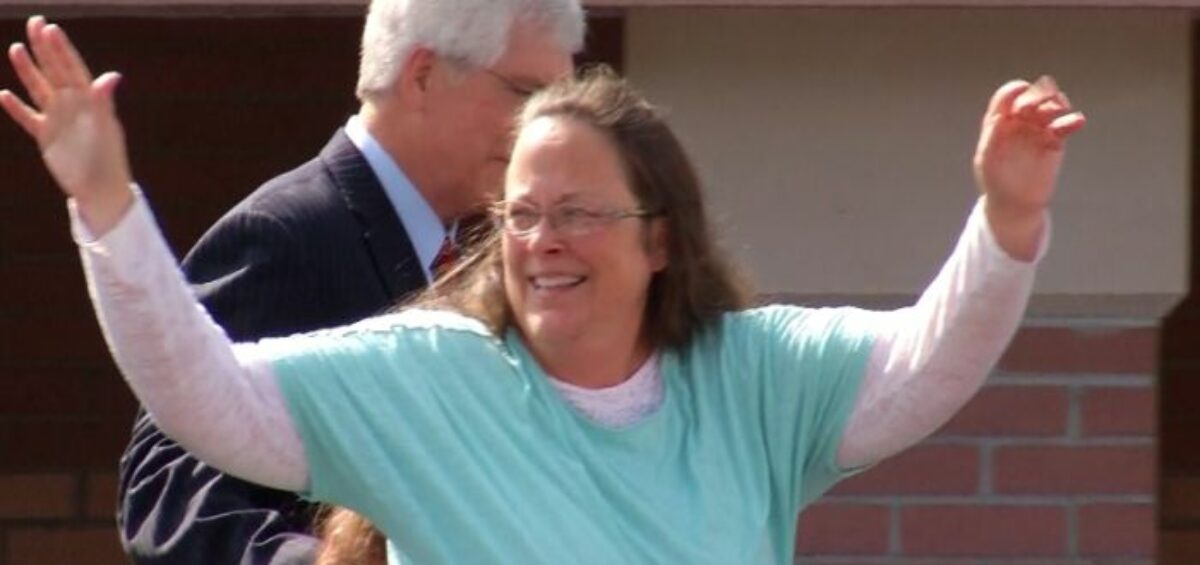
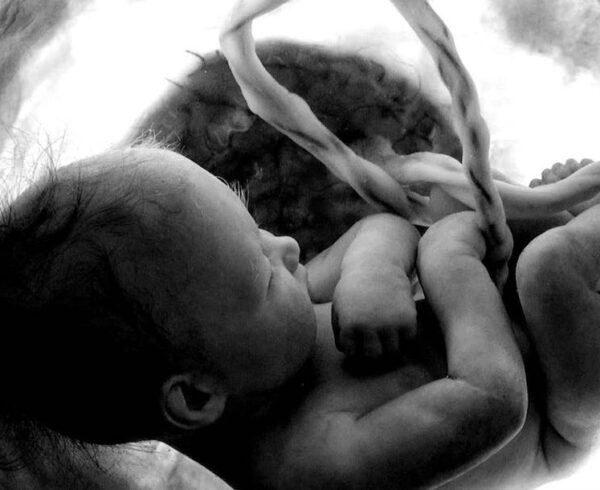




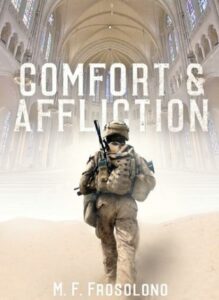

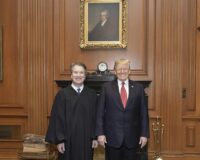
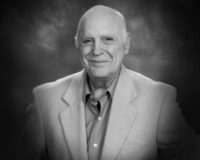
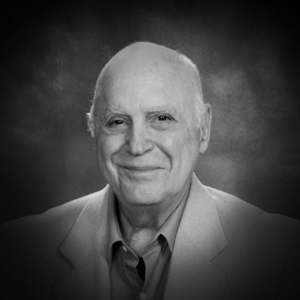
Mike, hey buddy. Thought-provoking. As you know, I disagree with the finer points of the article.
Judge Tonya Parker, a lesbian, refused for 3 years to marry heterosexual couples even though it is clearly law.
Mayor Gavin Newsome married same sex partners even though he broke the law doing so.
Should these two individuals have resigned from their position? If the answer is no, then this really isn’t about following our Constitution at all.
The conundrum is the federal government ruled on marriage, which is left to the states. Davis is a State employee so she is entrusted to execute her duties according to the State laws of Kentucky. Kentucky’s marriage laws and forms and documents were not even updated to accommodate for this ruling.
What the SCOTUS ruling did was open up a void in our legal system. And, instead of filling this void, like the State government should, it created a bigger void between our laws and the State and Federal laws. In fact, the Governor’s refusal to consider how and if the SCOTUS ruling applies to State law further supports that the United States is governed not by laws, but by suggestions when it suits us.
As far as the Constitution, Christianity, and Great Britain is concerned, I would concur that they certainly did not want a repeat of what happened in Great Britain. However to assume that they wished for a purely secular Constitution goes against Christianity in general. To assume that the Christian founders desired a purely secular government would be extremely difficult to prove and would suggest that these men were not Christians at all.
In the midst of the void created by the oposing views at the State and Federal level Davis relied on her conscious and the Bill of Rights to guide her.
Let’s be clear here. Time and time again laws were broken to get us to this point, why is Davis’ actions so appalling and others are not? Bases in past experience, that seem implausible.
Still I enjoy reading your articles. Love you brother. Praying for you and your wife my friend.
Shane, thanks for your comments. Please see my next blog post, which should appear in a few days. My editor is doing her thing on the draft before I send it to my marketing guru/web master. In the interim, you should be aware that the US Constitution, Article Six, clearly states that the Constitution is the supreme (civil) law of the US. Accordingly, as SCOTUS has ruled several time, when state and federal laws conflict, the federal law is supreme. That is, the SCOTUS ruling on same-gender marriage supersedes any state law on the subject.
“This Constitution, and the laws of the United States which shall be made in pursuance thereof; and all treaties made, or which shall be made, under the authority of the United States, shall be the supreme law of the land; and the judges in every state shall be bound thereby, anything in the Constitution or laws of any State to the contrary notwithstanding.